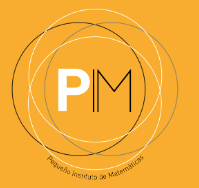Investigación
Noticias Destacadas
 Agenda del Departamento Agenda del Departamento |
- Información (provisional) sobre grupos y horarios de las asignaturas impartidas por el Departamento de Matemáticas, para el curso 2023-2024.
- Propuestas de Trabajos de Fin de Grado para el curso 2023-2024.
|
Canal @matematicasuamEnlace al canal del Departamento en youtube. |
PIM (Pequeño Instituto de Matemáticas)Con el objetivo de fomentar el interés por las matemáticas y dirigido a jóvenes entre 14 y 18 años, nace este proyecto de Instituto de Ciencias Matemáticas (ICMAT) en colaboración con nuestro Departamento, la Universidad Autónoma de Madrid y la Real Sociedad Matemática Española. El proyecto comienzó en el curso académico 2022-2023. Ampliar información en su página web. |
Machine learning in Madrid (zoom)
Lunes, 31 de enero de 2022, 14:30-15:30h (horario diferente al habitual!!!!)
Enlace: https://us06web.zoom.us/j/84060998817?pwd=UXV2d1R1SWV5TkhEd1JnY3hLdTZCQT09
Ponente: Dejan Slepcev (Carnegie Mellon University)
Título: Variational problems on ransom structures: analysis and applications to machine learning
Abstract: Modern data-acquisition technology produces a wealth of data about the world we live in. The goal of machine learning is to extract and interpret the information the data sets contain. This leads to variety of learning tasks, many of which seek to optimize a functional, defined on the available random sample.
The functionals take as the input the available data samples, yet we seek to make conclusions about the true distribution of data. To compare the outcomes based on finite data and the ideal outcomes that one would have if full information is available, we study the asymptotic properties of the discrete optimization problems based on finite random samples. We will discuss how calculus of variations and partial differential equations provide tools to compare the discrete and continuum descriptions for many relevant problems.
Furthermore, we will discuss how the insights from calculus of variations can be used to guide the design of the functionals used in machine learning.






